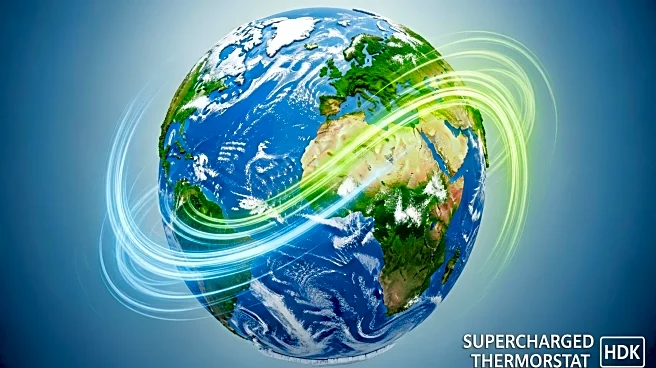What is the story about?
What's Happening?
Recent research has identified a 'supercharged thermostat' mechanism in Earth's climate system that could lead to an earlier onset of the next ice age. This mechanism involves the movement of phosphorus from land to ocean, which enhances the burial of carbon beneath the seafloor. The study, published in the journal Science, suggests that this process could counteract human-induced carbon emissions much faster than previously thought, potentially within 100,000 years. The research highlights the role of phytoplankton in the ocean, which proliferate in warmer conditions, leading to increased organic carbon deposition on the seafloor. This process could cool the climate by locking away carbon more efficiently than the known silicate weathering feedback, which operates over much longer timescales.
Why It's Important?
The discovery of this 'supercharged thermostat' is significant as it offers a new perspective on Earth's natural climate regulation mechanisms. While it does not mitigate the immediate impacts of global warming, it suggests that Earth's systems may eventually restore balance by accelerating the onset of the next ice age. This has implications for understanding long-term climate cycles and the resilience of Earth's climate system. The findings could influence future climate models and predictions, providing insights into how natural processes might counteract human-induced climate change over geological timescales.
What's Next?
The research opens new avenues for studying Earth's climate regulation processes, particularly the role of phosphorus in the ocean. Scientists may focus on understanding the precise mechanisms of phosphorus recycling and its impact on carbon burial. Further studies could explore how this thermostat interacts with other climate factors and its potential influence on future climate scenarios. The findings may also prompt discussions on the implications for climate policy and the importance of considering long-term natural processes in climate change mitigation strategies.
Beyond the Headlines
The study raises questions about the ethical and practical considerations of relying on natural processes to counteract human-induced climate change. It highlights the complexity of Earth's climate system and the need for comprehensive approaches to address global warming. The research underscores the importance of interdisciplinary collaboration in climate science, combining geology, biology, and mathematical modeling to uncover new insights into Earth's climate dynamics.















